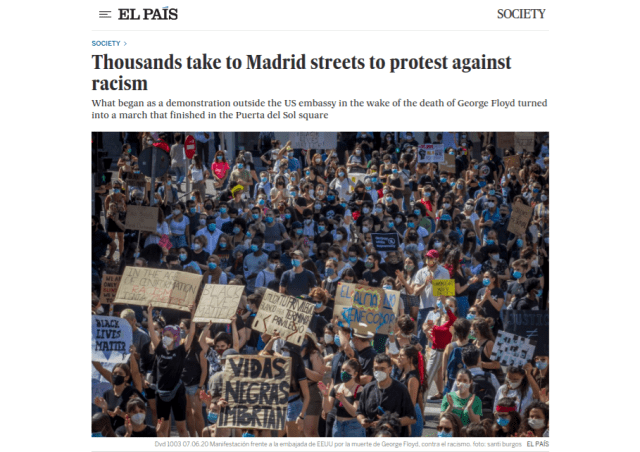In line with recent events linked to the Black Lives Matter movement, this blog post features ebooks and other titles dealing with racism and social prejudice in Spain, Portugal and Portuguese-speaking Africa available to Cambridge students and researchers.


Spain, which has traditionally been a melting pot of cultures, is currently facing a new reality. Immigration has brought a new variety of cultures and beliefs that has triggered attitudes of racism, intolerance and xenophobia. Romani gitanos, people of colour, Latin Americans and Muslims are some of the groups that have suffered discrimination in Spanish society in recent times.
Various policies of successive governments have sought to promote inclusive education, cultural and religious integration and social cohesion, but overall progress has been slow. Discrimination against migrants and vulnerable groups is still occurring at various levels including housing, education, health, access to services and the media.
Below is a selection of ebooks in Spanish and English from our collections:
- Racism and discourse in Spain and Latin America / Teun A. Van Dijk (2005): Temporary access granted by ProQuest during COVID-19 and by EBSCO until 31 July 2020.
Specifically dealing with migrant issues:
- El cálculo egoísta: inmigración y racismo en la España del siglo XXI / A. Sequén Mónchez (2010)
- Inmigración y diversidad cultural en España: un análisis histórico desde la perspectiva de los derechos humanos / P. Garrido Rodríguez (2012)
- Los inmigrantes irregulares en España: la vida por un sueño / J.I. Ruiz Olabuénaga and others (2012)
- Las representaciones de las migraciones en los medios de comunicación / A. Granados Martínez (2013)
Dealing with discrimination against minority groups:
- Islam: pasado, presente y futuro: ¿hacia una sociedad intercultural? / A.M. Carballeira Debasa and others (2016)
- De condición feminina, inmigrante y excluída: la mujer latinoamericana en España / G. Benítez Burgos (2015)
- La cárcel del feminismo: hacia un pensamiento islámico decolonial / Sirin Aldbi Sibai (2016): Sirin is a Spanish-Syrian researcher
- El otro colonialismo: España y África entre imaginación e historia / Christian Von Tschilschke, Jan-Henrik Witthaus (2017)
- Observing Islam in Spain: contemporary politics and social dynamics / Ana I. Planet Cotreras (ed.) (2018)
- Spain unmoored migration, conversion and the politics of Islam / M. H. Rogozen-Soltar (2017): Temporary access granted by ProQuest during COVID-19 and by EBSCO until 31 July 2020.
Also available in print only:
- La España racista: la lucha en defensa de las víctimas del odio / E. Ibarra (2011)
- Integración sociocultural de las minorías étnicas: gitanos e inmigrantes / J. Garreta Bochaca (2003)

Unsurprisingly, given Portugal’s long colonial history, race and racism play a huge part in Portuguese history and society. Portugal in fact initiated both the first wave of European colonisation in the early 15th century and the Atlantic slave trade a century or so later. The involvement of Portugal is therefore fundamental to almost every aspect of colonial and racial history. This is particularly true in relation to Brazil, the most important territory in the Portuguese Empire (and the focus of the country’s slave trade) until the early 19th century. This post includes some titles dealing with race and racism in Brazil.

By the 20th century, Portuguese colonial activity was focussed on territories in Africa. These countries, making up what is now known as PALOP, have arguably had the greatest impact on race and racism in modern Portugal. In the 1950s, when post-war decolonisation movements were gaining momentum around the world, António de Oliveira Salazar’s Estado Novo government adopted the Brazilian sociologist Gilberto Freyre’s theory of Luso-tropicalism, which held that the Portuguese were better and more humane colonisers than other European countries, in order to justify maintaining Portugal’s “pluricontinental nation”. Of course, Luso-tropicalism was not the reality for most of those who experienced Portuguese colonialism. Racism was always fundamental to Portugal’s colonial project and here are some titles held by the UL dealing with this.
Ebooks
- The colours of the empire : racialized representations during Portuguese colonialism / Patrícia Ferraz de Matos (2013) [2006 Portuguese-language original version available in print here]
- Catholicism, Race and Empire Eugenics in Portugal, 1900-1950 / Richard Cleminson (2014)
- Anti-empire : decolonial interventions in Lusophone literatures / Daniel F. Silva (2018)
- Luso-tropicalism and its discontents : the making and unmaking of racial exceptionalism / edited by Warwick Anderson, Ricardo Roque, and Ricardo Ventura Santos (2019)
- De escravo a cozinheiro : colonialismo & racismo em Moçambique / Valdemir Zamparoni (2007)
- Racismo em português : o lado esquecido do colonialismo / Joana Gorjão Henriques (2016)
Obviously the story does not end with the independence of PALOP countries in the mid-1970s. Many people from these countries emigrated to Portugal in the years that followed independence, and they and their descendants still face a great deal of racial discrimination and social inequity. Unfortunately the UL only holds one (English-language) ebook dealing with these issues (Managing African Portugal : the citizen-migrant distinction / Kesha Fikes, 2009), but here are some related Portuguese-language titles available in print:
- Preto e branco : a naturalização da discriminação racial / Rosa Cabecinhas (2007)
- Os filhos de África em Portugal : antropologia, multiculturalidade e educação / Neusa Maria Mendes de Gusmão (2004)
- Simetrias e identidades : jovens negros em Portugal / Jorge Vala (2003)
- Caminhos para a prisão : uma análise do fenómeno da criminalidade associada a grupos estrangeiros e étnicos em Portugal / Sílvia Gomes (2014)
- Livro negro do racismo em Portugal / Elsa Sertório (2001)
- Expressões dos racismos em Portugal / Jorge Vala, Rodrigo Brito, Diniz Lopes (1999)
Sonia Morcillo and Chris Greenberg


